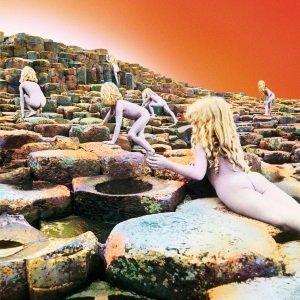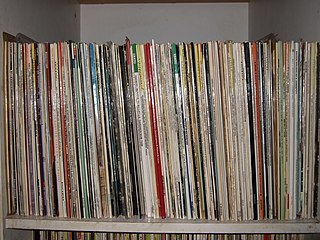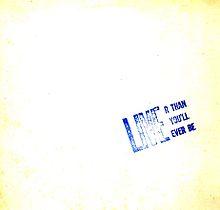
Led Zeppelin were an English rock band formed in London in 1968. The band comprised Robert Plant (vocals), Jimmy Page (guitar), John Paul Jones and John Bonham (drums). With a heavy, guitar-driven sound and drawing from influences including blues and folk music, Led Zeppelin are cited as a progenitor of hard rock and heavy metal. They significantly influenced the music industry, particularly in the development of album-oriented rock and stadium rock.

Houses of the Holy is the fifth studio album by the English rock band Led Zeppelin, released on 28 March 1973 in the United States and on 30 March 1973 in the United Kingdom by Atlantic Records. The album benefited from two band members installing studios at home, which allowed them to develop more sophisticated songs and arrangements and expand their musical style. Several songs subsequently became fixtures in the group's live set, including "The Song Remains the Same", "The Rain Song" and "No Quarter". Other material recorded at the sessions, including the title track, was shelved and released on the later albums Physical Graffiti (1975) and Coda (1982). All instruments and vocals were provided by the band members Robert Plant (vocals), Jimmy Page (guitar), John Paul Jones, and John Bonham (drums). The album was produced by Page and mixed by Eddie Kramer. The cover was the first for the band to be designed by Hipgnosis and was based on a photograph taken at Giant's Causeway in Northern Ireland.

Too Fast for Love is the debut studio album by American heavy metal band Mötley Crüe. The first edition of 900 copies was released on November 10, 1981, on the band's original label Leathür Records. Elektra Records signed the band the following year, at which point the album was remixed and partially re-recorded. This re-release, with a different track listing and slightly different artwork, has become the standard version from which all later reissues derive. The re-recorded album also removed the song "Stick to Your Guns", though it is featured on a bonus track version of the album. The original mix of the album remained unreleased on CD until 2002, when it was included in the Music to Crash Your Car To: Vol. 1 box set compilation.

A bootleg recording is an audio or video recording of a performance not officially released by the artist or under other legal authority. Making and distributing such recordings is known as bootlegging. Recordings may be copied and traded among fans without financial exchange, but some bootleggers have sold recordings for profit, sometimes by adding professional-quality sound engineering and packaging to the raw material. Bootlegs usually consist of unreleased studio recordings, live performances or interviews without the quality control of official releases.

Record collecting is the hobby of collecting sound recordings, usually of music, but sometimes poetry, reading, historical speeches, and ambient noises. Although the typical focus is on vinyl records, all formats of recorded music can be collected.

Motörhead is the debut studio album by English rock band Motörhead. It was released on 12 August 1977 by pub rock and early punk rock label Chiswick Records, one of the first for the label, and the band's only release under Chiswick. The album contains the "classic" Motörhead line-up of Lemmy Kilmister on bass and vocals, "Fast" Eddie Clarke on lead guitar, and Philthy Animal Taylor on drums. The sleeve artwork featured the debut of Snaggletooth, the War-Pig, the fanged face logo created by artist Joe Petagno that would become an icon of the band.
The Amazing Kornyfone Record Label (TAKRL) was one of the first bootlegging record labels in America. Kornyfone was based in Southern California in the 1970s. The label released albums from such artists as The Beatles, David Bowie, Bob Dylan, The Grateful Dead, Led Zeppelin, Elton John, Joni Mitchell, Pink Floyd, Genesis, and others. Kornyfone was known for its packaging, with interesting artwork and informative covers.
The Led Zeppelin bootleg recordings are a collection of audio and video recordings of musical performances by the English rock band Led Zeppelin which were never officially released by the band, or under other legal authority. The recordings consist of both live concert performances and outtakes from studio sessions conducted by the band. Many hundreds of Led Zeppelin bootlegs exist, and are widely collected by fans.

Listen To This, Eddie is a bootleg recording of a rock concert by English band Led Zeppelin, performed on June 21, 1977, at the Los Angeles Forum in Los Angeles, California. The first concert of a six-night stint. It is often noted as one of the band's most noteworthy performances. It is also distinguished by its clear sound.

Great White Wonder, or GWW, is a rock bootleg album, released in July 1969, containing unofficially released recordings by Bob Dylan. It is the first notable rock bootleg, and specifically the first release from bootleg record label Trademark of Quality. Seven of the twenty-four tracks presented here were recorded with The Band in the summer of 1967 in West Saugerties, New York, during the informal sessions that were later released in a more complete form in Dylan's 1975 album The Basement Tapes. Much of the other material consists of a recording made in December 1961 in a Minnesota hotel room, studio outtakes from several of Dylan's albums, and a live performance on The Johnny Cash Show. It was the first time that these previously unreleased recordings came to the market; many more would be released in similar formats over the coming years, though most were single albums, not double albums like this record.

Live on Blueberry Hill is a bootleg recording of English rock group Led Zeppelin's performance at the Los Angeles Forum on September 4, 1970, which took place during their summer 1970 North American Tour.

For Badgeholders Only is a bootleg recording of a rock concert by English band Led Zeppelin, performed on June 23, 1977 at the Los Angeles Forum in Los Angeles, California, a show which came towards the end of the band's 1977 North American concert tour.

Burn Like a Candle is a bootleg recording of the English rock group Led Zeppelin's performance at the Los Angeles Forum on June 25, 1972. It was originally released on CD format in the 1990s by the Smoking Pig label.

Rude Bootleg is a live album by the English rock band Cardiacs. It is the band's first live album, and was originally recorded at the Reading Rock Festival on 24 August 1986.

Live'r Than You'll Ever Be is a bootleg recording of the Rolling Stones' concert in Oakland, California, from 9 November 1969. It was one of the first live rock music bootlegs and was made notorious as a document of their 1969 tour of the United States. The popularity of the bootleg forced the Stones' labels Decca Records in the UK, and London Records in the US, to release the live album Get Yer Ya-Ya's Out! The Rolling Stones in Concert in 1970. Live'r is also one of the earliest commercial bootleg recordings in rock history, released in December 1969, just two months after the Beatles' Kum Back and five months after Bob Dylan's Great White Wonder. Like the two earlier records, Live'r's outer sleeve is plain white, with its name stamped on in ink.

Spring of Two Blue-J's is a 1974 live album by Cecil Taylor, the second set of a "return concert" recorded at The Town Hall in New York City in November 1973. Originally released on Taylor's Unit Core label, bootlegged on European CDs, it was legitimately reissued for the first time in 2022 on global streaming platforms by its original producer, Fred Seibert's Oblivion Records. The LP features one side-long solo performance by Taylor and one side-long quartet performance with Jimmy Lyons, Sirone, and Andrew Cyrille.
Trademark of Quality was a bootleg record label based in Los Angeles, California, and was established in 1970 by "Dub" Taylor and Ken Douglas. In the summer of 1969, they released Bob Dylan's "GWW" Great White Wonder with a white fold-out cover and white labels. Another 9 titles followed before they 1970 created the "farm pig" logo and the TMQ label was fact then they began fastening round fluorescent stickers on the outside of their rubber-stamped jackets which read 'Trade Mark Of Quality,' and bore the profile of a farm pig. The Frank Zappa - 200 Motels release was the first to bear such a sticker. Over time, custom pig labels were added along with xerox insert covers.

Golden Eggs is an unlicensed compilation of previously released recordings by English rock group the Yardbirds. The LP record album was originally issued in 1975 by Trademark of Quality (TMQ), a Los Angeles–based enterprise that specialised in bootleg recordings.
The Swingin' Pig Records was a bootleg label that mostly released LPs and singles, best known for unauthorized recordings of The Beatles, Led Zeppelin and The Rolling Stones. The first publications were made in the early 1980s, when they released three singles and about twenty LPs. The label became one of the first to release bootleg CDs, the first to offer bootleg CDs in high-quality box sets. A sublabel, Magic Dwarf Records, offered records from the Beatles and Rolling Stones in 1988.













